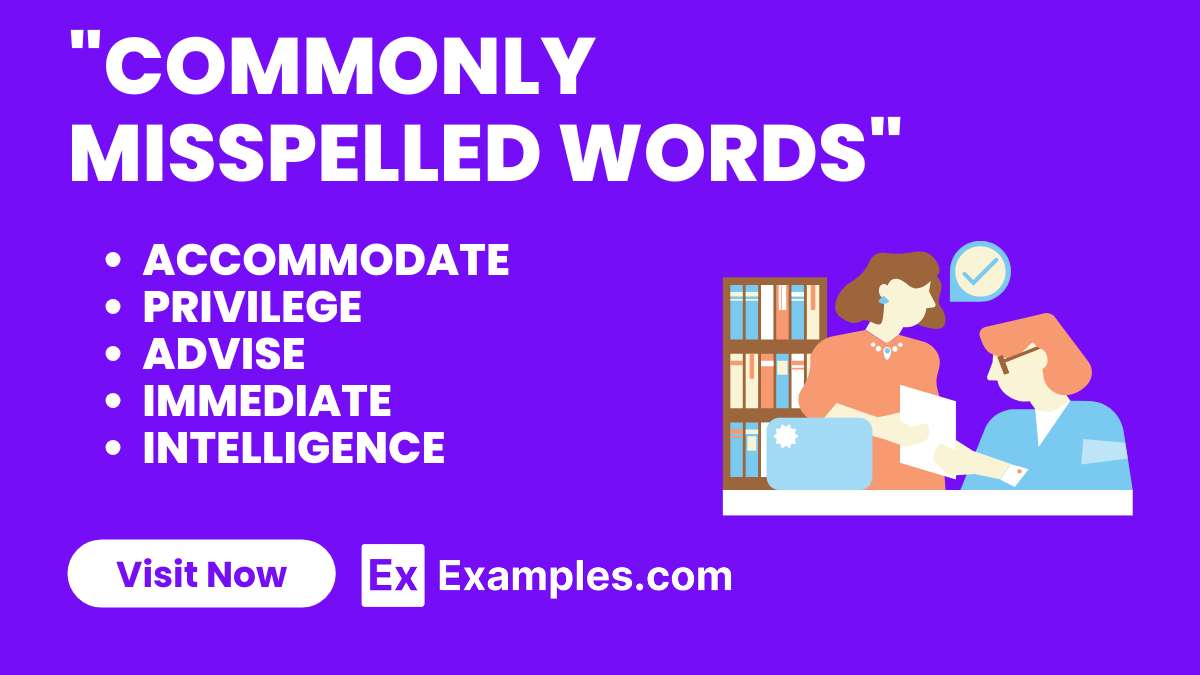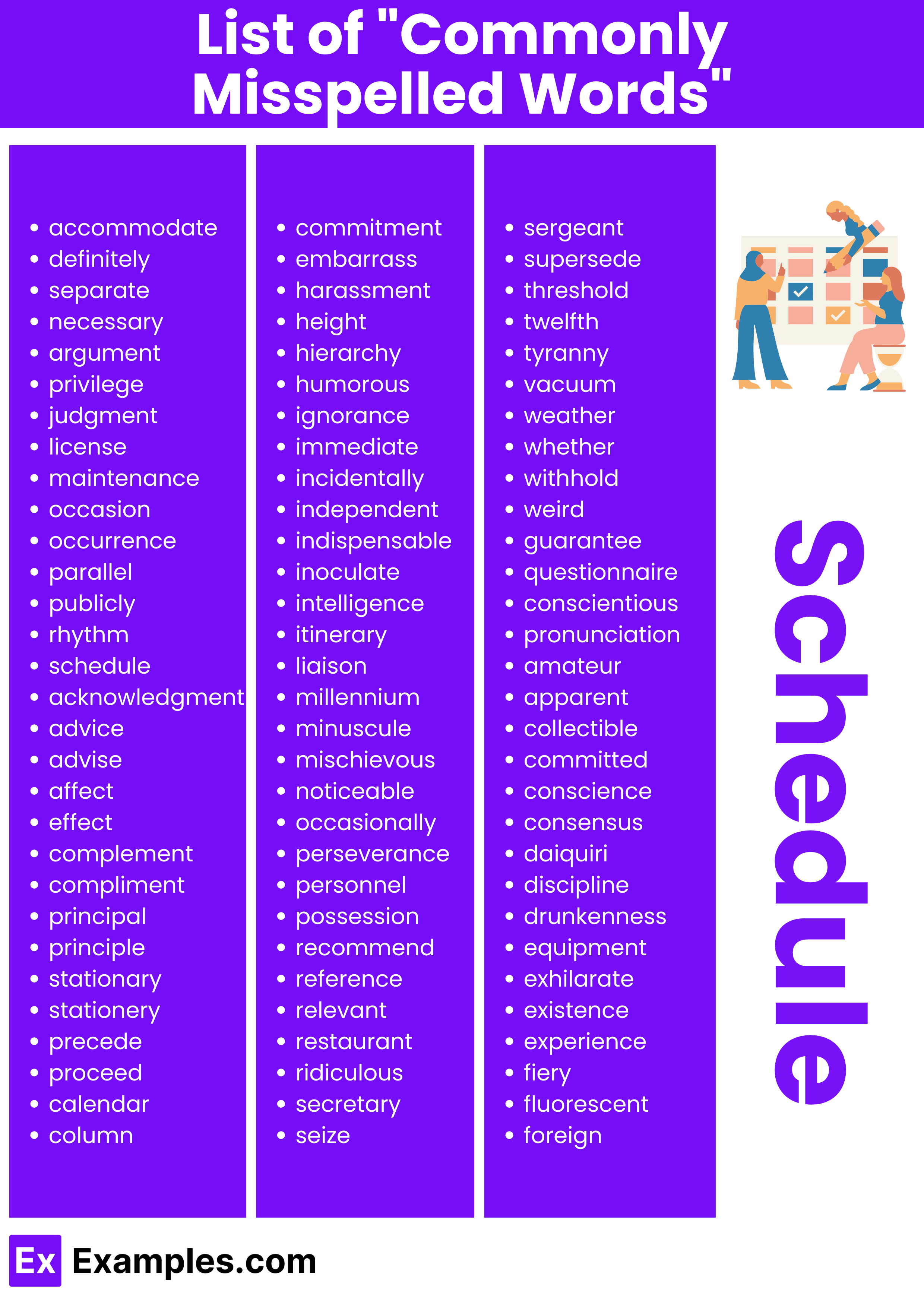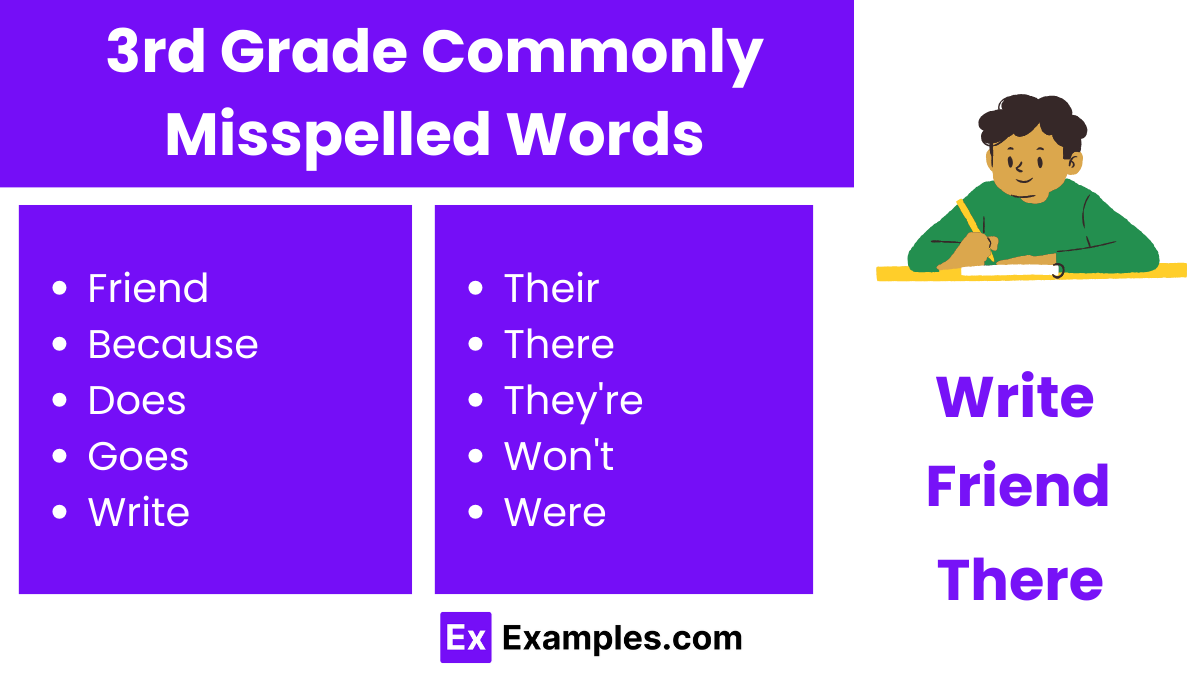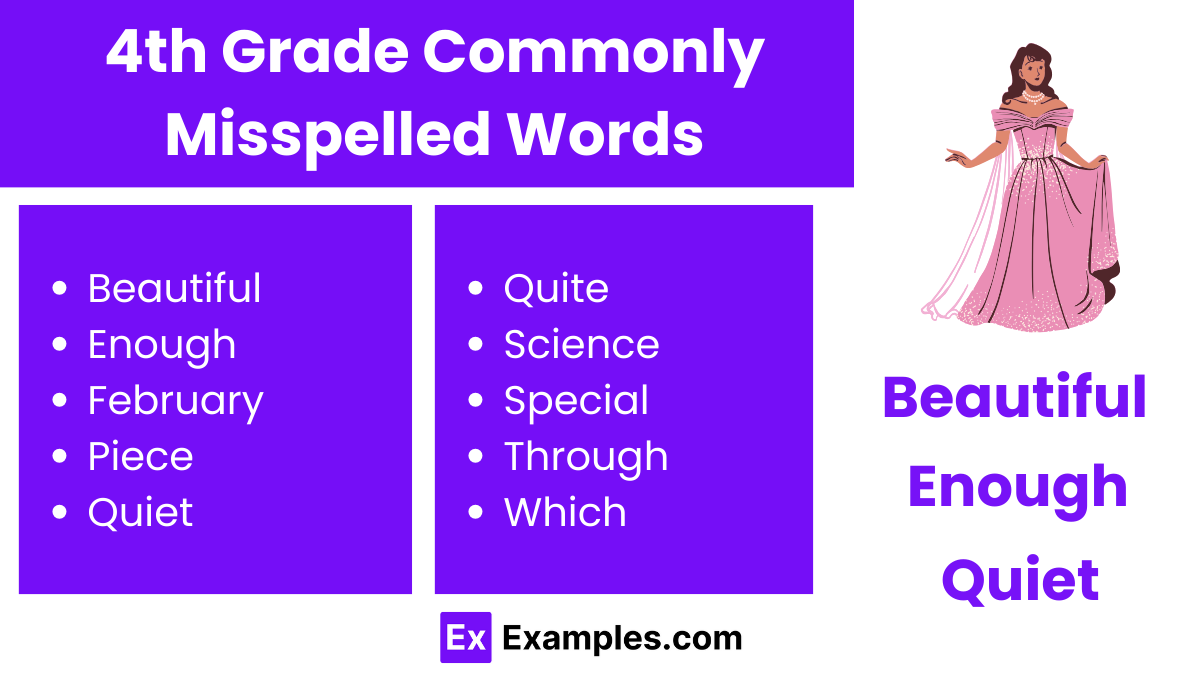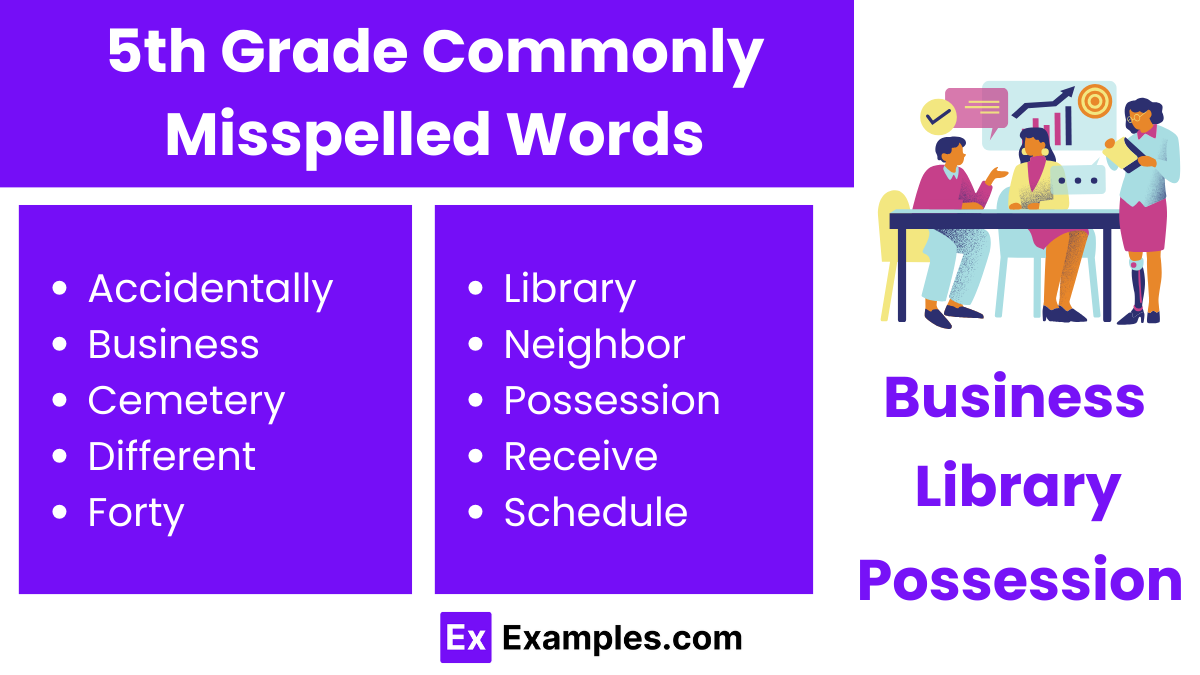450+ Commonly Misspelled Words List, Meaning, PDF
Embark on a journey through the minefield of commonly misspelled words, where even the most proficient writers sometimes stumble. This exploration delves into words that frequently trick us with their unconventional spellings, silent letters, and perplexing rules. From the deceptive simplicity of “definitely” to the notorious challenges of “accommodate” and “separate,” this guide illuminates the pitfalls of English spelling, offering valuable insights and tips to navigate these tricky linguistic waters with confidence and ease.
Download Lis of Commonly Misspelled Words - PDF
100+ List of Commonly Misspelled Words
Navigating the intricacies of the English language, we often encounter words that defy the norms of spelling, leading to common errors that can perplex even seasoned writers. This exploration into commonly misspelled words serves as a beacon for those seeking to master the art of spelling, offering clarity amidst linguistic complexities. From homophones that sound identical but are spelled differently, like “compliment” and “complement,” to words with silent letters such as “knight” and “gnome,” the English language is rife with challenges. Additionally, words with multiple acceptable spellings, like “judgment” or “judgement,” add to the confusion, varying by region and preference.
| accommodate | definitely | separate | necessary |
| argument | privilege | judgment | license |
| maintenance | occasion | occurrence | parallel |
| publicly | rhythm | schedule | acknowledgment |
| advice | advise | affect | effect |
| complement | compliment | principal | principle |
| stationary | stationery | precede | proceed |
| calendar | column | commitment | embarrass |
| harassment | height | hierarchy | humorous |
| ignorance | immediate | incidentally | independent |
| indispensable | inoculate | intelligence | itinerary |
| liaison | millennium | minuscule | mischievous |
| noticeable | occasionally | occurrence | perseverance |
| personnel | possession | precede | proceed |
| recommend | reference | relevant | restaurant |
| rhythm | ridiculous | schedule | secretary |
| seize | separate | sergeant | supersede |
| threshold | twelfth | tyranny | vacuum |
| weather | whether | withhold | weird |
| accommodate | guarantee | questionnaire | conscientious |
| pronunciation | amateur | apparent | calendar |
| collectible | column | committed | conscience |
| conscientious | consensus | daiquiri | definitely |
| discipline | drunkenness | embarrass | equipment |
| exhilarate | existence | experience | fiery |
| fluorescent | foreign | forfeit | gauge |
| grateful | guarantee | harassment | height |
3rd Grade Commonly Misspelled Words
Even at the foundational levels of education, certain words present spelling challenges to young learners. In the 3rd grade, as students expand their vocabulary, they encounter words that defy simple phonetic rules or introduce complex patterns. This list not only highlights these tricky words but also serves as a tool for educators to reinforce spelling strategies, such as breaking words into syllables, identifying root words, and recognizing common suffixes and prefixes.
- Friend – A person whom one knows and has a bond of mutual affection.
- Because – Used to introduce a word or phrase that stands for a clause expressing a reason.
- Does – Third person singular present of “do”.
- Goes – Third person singular present of “go”.
- Write – To mark (letters, words, or other symbols) on a surface, typically paper, with a pen, pencil, or similar implement.
- Their – Belonging to or associated with the people or things previously mentioned or easily identified.
- There – In, at, or to that place or position.
- They’re – Contraction of “they are”.
- Won’t – Contraction of “will not”, indicating a refusal or failure to perform an action.
- Were – Second person singular past, plural past, and past subjunctive of “be”.
4th Grade Commonly Misspelled Words
As 4th graders delve deeper into language arts, they encounter a broader range of words that challenge their spelling skills. This critical stage in education calls for a focus on words that include silent letters, irregular spellings, and homophones, which are pivotal for enhancing writing fluency and comprehension.
- Beautiful – Pleasing the senses or mind aesthetically.
- Enough – As much or as many as required.
- February – The second month of the year, in the northern hemisphere usually considered the last month of winter.
- Piece – A portion of an object or of material, produced by cutting, tearing, or breaking the whole.
- Quiet – Making little or no noise.
- Quite – To the utmost or most absolute extent or degree; absolutely; completely.
- Science – The intellectual and practical activity encompassing the systematic study of the structure and behavior of the physical and natural world through observation and experiment.
- Special – Better, greater, or otherwise different from what is usual.
- Through – Moving in one side and out of the other side of (an opening, channel, or location).
- Which – Asking for information specifying one or more people or things from a definite set.
5th Grade Commonly Misspelled Words
By 5th grade, students are refining their spelling skills with more complex vocabulary that prepares them for middle school. This level introduces words with foreign roots, irregular plural forms, and advanced homophones, challenging students to apply their knowledge of spelling rules and patterns more critically.
- Accidentally – By chance; inadvertently.
- Business – A person’s regular occupation, profession, or trade.
- Cemetery – A burial ground; a graveyard.
- Different – Not the same as another or each other; unlike in nature, form, or quality.
- Forty – The number equivalent to the product of four and ten; ten less than fifty; 40.
- Library – A building or room containing collections of books, periodicals, and sometimes films and recorded music for people to read, borrow, or refer to.
- Neighbor – A person living near or next door to the speaker or person referred to.
- Possession – The state of having, owning, or controlling something.
- Receive – Be given, presented with, or paid (something).
- Schedule – A plan for carrying out a process or procedure, giving lists of intended events and times.
Commonly Misspelled Words
1. Occurred
Common misspelling: occured
Always two “r” letters! According to English pronunciation rules, with one “r,” it would be pronounced as “oh-cured” which means … nothing!
2. Publicly
Common misspelling: publically
The most commonly misspelled word, according to the Oxford Dictionary. One reason is that this word violates a general spelling rule in English: for words ending in “ic,” you should add “ally” (e.g., logically). There’s one only major exception to this rule — and yep, you guessed it: “Public,” which adds an “ly.”
3. Recommend
Common misspellings: recomend, reccommend
Here’s another case where double letters confuse people. They often think there are two sets of double letters instead of just one, or none at all. Just keep in mind that this word combines “commend” with the prefix “re” — and it’ll spell itself.
4. Successful
Common misspellings: succesful, successfull, sucessful
It’s the combos of repeated consonants that can make spelling successful, well, unsuccessful. Just know that it has the doubles in the middle (two “s’s” and two “c’s”), but only one consonant at the beginning and one at the end.
5. Withhold
Common misspelling: withold
Here we are with the compound word/double consonants issue again. But it’s “with” and “hold” combined, not “with” and “old” or “wit” and “hold,” so you need the two “h’s” in there.
6.Fulfill
Common misspelling: fulfil
Fulfill is used a lot if you’re in sales, so it pays to spell it correctly. Technically, both spellings — “fulfill” and “fulfil” — are correct. Here in the U.S., though, it’s best to go with the first. In the U.K., it’s the other way around. (But wherever you are, never forget that first “l.”)
7. Experience
Common misspelling: experiance
The problem here is that the “ance” and “ence” endings both usually mean the same thing, and can sound similar. The differences in spelling usually depend on the original Latin root word and how it came into English. We say skip the rules and just memorize the difference (or seek assistance).
8. Conscientious
Common misspelling: consciencious
This one has a “t” and not a “c” near the end, even though it comes from the word conscience. One mnemonic: If you’re conscientious, you don’t only dot your “i’s,” you also cross your “t’s” (so put a “t” in this word)!
9. Calendar
Common misspelling: calender
To most people, that “ar” as an ending looks weird, so they naturally want to write it as “er.” The reason for the “ar”? Calendar comes from the Latin word kalendarium, and we English speakers chopped off the “ium.”
10. Acknowledgment
Common misspelling: acknowledgement
Even though you might be corrected if you slap that “e” in between the “g” and the “m,” the spelling is still right! With the “e” is the typical British spelling, without the “e” is American. So unless you’re looking for a job across the pond, stick with “acknowledgment.”
11. Separate
Common misspelling: seperate
Even spelling nerds sometimes have to stop for a second with this one. In fact, a study done in Great Britain found it was the number one most commonly misspelled word (it also ranks as the top misspelled word in Google searches). But you’ll always get it right if you remember that the “r” separates two “a’s.”
12.Until
Common misspelling: untill
Even though we know the word “till” is a word and “til” isn’t, there is only one “l” in until.
13.Relevant
Common misspellings: relevent, revelant
Many people put an “e” in instead of the (correct) “a,” or they transpose the “v” and the “l,” coming up with a new — and incorrect — word.
14. Privilege
Common misspellings: privelege, priviledge
Only one “e” and no “d,” even though it sounds like it needs it. For this spelling, blame the Romans. That last part “lege” is a form of the word lex, or law (with no “d” either).
15.Necessary
Common misspellings: neccessary, necessery
A word we all see and use frequently, but that throws many of us off when it comes to spelling. Typically the dilemma is which consonant is doubled — the “s”?” The “c”? Or both? The right answer is just the “s.”
16.Liaison
Common misspelling: liasion
This word often trips people up because the spelling is so non-standard for English — which makes sense, since it’s a French word. It’s easy to put the vowels in the wrong order to make it look “right” to our eyes (or to completely miss that second “i”)!
17. Underrate
Common misspelling: underate
Yet another compound word in which you should double the consonants that end the first word and start the second. If you spell it with only one “r,” you’ve come up with a neologism (a new word) that could mean having eaten less than expected.
18. Referred
Common misspelling: refered
Remember this general rule: When adding an “ed” at the end, if you stress the last syllable of a word with a vowel and a consonant (in this case, an “e” and an “r”), the consonant should be doubled. If not, then don’t (e.g., offer and offered).
19. Pastime
Common misspelling: pasttime
Unlike some other compound words consisting of two words ending and beginning with the same letter (see “underrate” below), pastime doesn’t have two “t’s.”
20.Occasion
Common misspelling: occassion
Let’s take this occasion to say that there’s only one “s” in this word. The reason is that the “sion” is actually a form of a “tion” ending, as in action. There’s no double “t” there, no double “s” here.
In conclusion, mastering commonly misspelled words is a crucial step in enhancing writing skills and boosting confidence in language use. By familiarizing ourselves with these tricky terms, we pave the way for clearer, more effective communication. This journey not only aids in academic success but also fosters a lifelong appreciation for the nuances and richness of the English language.



